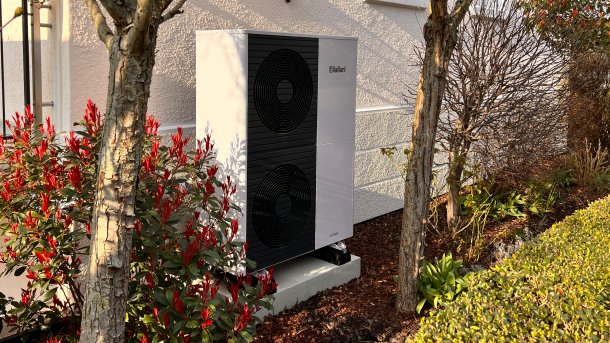Heat pumps: Heating industry sales down 54 percent
Germany was supposed to get 500,000 heat pumps every year. In all likelihood, the German government's target will not be met this year.

Heat pump on a residential building in Bremen.
(Image: heise online / anw)
The German heating industry has sold 90,000 heat pumps in the past six months. According to the Federal Association of the German Heating Industry (BDH), this is 54 percent fewer than in the same period last year. For the year as a whole, the BDH expects 200,000 heat pumps to be sold, even though the number of heating subsidies approved by the KfW in May and June increased by 21 and 40 percent respectively compared to the respective months of the previous year. Two years ago, the German government set a target of at least 500,000 heat pumps per year.
Overall, manufacturers sold 378,000 heat generators in the first half of the year, around 43 percent fewer than in the same period in 2023, which was a record year. In May of this year, total sales were still down by 35 percent, according to the BDH. 223,000 of the heat generators sold are powered by gas, 43 percent less than a year ago; 55,000 units are powered by oil, an increase of 14 percent. The industry sold around 10,000 heat generators powered by biomass - primarily wood - 74 percent less than in the previous year.
"Confusing mixed situation"
After four years of growth and especially after the record year 2023, which was characterized by special effects, the market is back at the long-term sales level prior to 2020, explains BDH Managing Director Markus Staudt. When advising potential customers, it is challenging to explain the connections between the Building Energy Act, municipal heating planning and, in some cases, subsidies. "In this confusing situation, people tend to put off modernizing their heating systems," says Staudt.
Videos by heise
The BDH considers around half of the 21.5 million heating systems in Germany to be technically obsolete. The BDH believes that this could cause politicians to miss the climate targets in the building sector. "Particularly with regard to the Climate and Transformation Fund 2025, it is therefore of central importance that the German government sends a signal of confidence to citizens." Government support for heating modernization must continue in 2025 as it did in 2023. The Federal Ministry of Economics has not yet responded to an inquiry from heise online.
The reform of the Building Energy Act (GEG), which was discussed last year and is now in force, stipulates that 65% of newly installed heating systems must be powered by renewable energies. This requirement only applies to existing buildings once the local authorities have submitted their heating plans, by mid-2026 at the latest in large municipalities and mid-2028 in small municipalities. The law on which this is based was also passed in the fall of 2023.
(anw)